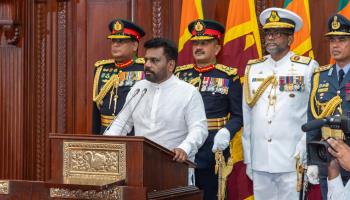Just one day after assuming office, the new president called snap parliamentary elections
On September 24, President Anura Kumara Dissanayake announced parliament’s dissolution to pave the way for snap parliamentary elections, which he said would take place on November 14. Dissanayake, leader of the leftist Janatha Vimukthi Peramuna (JVP) party, assumed office on September 23, after winning the September 21 presidential election. The JVP-led National People’s Power (NPP) alliance had just three out of 225 seats in the dissolved legislature.
What next
Subsidiary Impacts
- Dissanayake’s alliance will almost certainly improve considerably on its seat tally, even if it falls short of a majority.
- The president will aim to consolidate ties with all of Sri Lanka’s main partners, transcending his party’s traditional pro-China approach.
- Negotiations with the IMF will be a major preoccupation for the government in the months ahead.
Analysis
The presidential election was the country’s first to go to a second count:
- No candidate had an absolute majority on the first count, but Dissanayake was top with 42% of votes followed by Premadasa with 33%.
- All other candidates — including incumbent Wickremesinghe (17%) — were then eliminated from the race, and Dissanayake prevailed (56% to 44%) after redistribution of voter preferences (see SRI LANKA: President is unlikely to win another term – September 12, 2024).
The JVP never previously held the presidency. Moreover, it was responsible for two insurgencies in the 1970s and 1980s that resulted in thousands of deaths.
Dissanayake became its leader in 2014. He apologised for its past and promised that it would never again resort to violence.
The NPP’s establishment in 2019 helped broaden its base. Although the JVP retains the structure of a Marxist-Leninist party, it is these days more a centre-left player in practice.
The JVP remains associated with Sinhalese Buddhist nationalism, still a strong force within the ethnic Sinhalese Buddhist majority. However, Dissanayake avoided majoritarian rhetoric during his presidential poll campaign, conveying a more inclusive message (see SRI LANKA: Outlook is bright for key leftist leader – May 1, 2024).
Cabinet and policies
For the time being, Dissanayake is relying on a markedly small cabinet to carry forward his policy agenda.
Shortly before dissolving parliament, he appointed party colleague Harini Amarasuriya prime minister. She succeeded Dinesh Gunawardena, who resigned from the post a day earlier.
Amarasuriya — the country’s third female prime minister — has a background in academia. She is among the individuals who have helped moderate the JVP’s image in recent years.
Dissanayake assigned cabinet portfolios to himself, Amarasuriya and Vijitha Herath, another JVP lawmaker. The three are emphasising the importance of ministerial secretaries, reflecting their increased reliance on these officials.
The cabinet is markedly small at present
During campaigning for the presidential poll, Dissanayake said he would not abandon the country’s four-year, USD3bn Extended Fund Facility (EFF) programme with the IMF but would look to renegotiate some of its tougher conditions. The programme began in March 2023, roughly ten months after Sri Lanka formally defaulted on its external debt.
Debt restructuring is a key requirement of the bailout.
On September 19, Sri Lanka announced agreements in principle on such restructuring with holders of its international sovereign bonds — specifically the Ad Hoc Group of Bondholders (representing international investors) and the Local Consortium of Sri Lanka (representing domestic financial institutions) — and the China Development Bank. In July, it announced a provisional agreement with the international bondholders. However, it was forced to renegotiate parts of this after certain objections from its Official Creditor Committee (OCC) and the IMF.
The breakthroughs should lead to finalised agreements. In June, Sri Lanka signed restructuring deals with the OCC and the Export-Import Bank of China following in-principle agreements reached in 2023.
Still, there may be complications if Dissanayake tries to change the bailout’s terms. Herath said yesterday that Colombo will have detailed talks with the IMF on the programme’s framework on the sidelines of the Fund’s annual meetings later this month.
Sri Lanka has received three tranches of the EFF loan to date. Receipt of the fourth will hinge on completion of the programme’s third review.
Even at the risk of perturbing the IMF, Dissanayake will commit to new government expenditure aimed at reducing economic pressures on ordinary citizens. In his first week as president, he authorised an increase to the fertiliser subsidy for paddy farmers and introduction of a fuel subsidy for fishermen (the Election Commission of Sri Lanka suspended these moves, saying they could create an unfair advantage ahead of the parliamentary polls).
Dissanayake promised while campaigning for the presidency that he would swiftly dissolve parliament to facilitate early legislative elections and thereafter strive to abolish the executive presidency.
Seeking a majority
The NPP will emphasise that it needs a parliamentary majority to fulfil its promises. Sri Lanka’s semi-presidential government system can lead to political gridlock if parliament’s majority bloc is not supportive of the president.
Dissanayake dissolved parliament nearly eleven months before the scheduled expiry of its term.
In the upcoming polls, 196 MPs will be elected from 22 multi-member constituencies through a system of open-list proportional representation. The remaining 29 seats will be allocated to parties based on their share of the national vote.
The SJB, in effect a UNP offshoot, led the opposition in the dissolved parliament.
A UNP-SJB alliance or merger would make it difficult for the NPP to win a majority. However, there is no sign that any such thing is close at hand.
Just as Wickremesinghe-Premadasa rivalry helped Dissanayake become president, continued UNP-SJB competition would benefit the NPP at these polls.
Wickremesinghe sought re-election last month as an independent. Regarding the November elections, the UNP says he will neither participate as a constituency candidate nor seek a national-list seat. Nevertheless, this could change.
The SLPP will likely lose considerable electoral ground
The three NPP seats in the dissolved legislature were all held by the JVP.
A major swing in the NPP’s favour is a realistic prospect. Dissanayake won just 3% of votes in the 2019 presidential election, finishing a distant third behind Gotabaya Rajapaksa and runner-up Premadasa. However, he and his party grew in popularity as the country’s economic troubles intensified.
During the presidential race, the NPP used social media more effectively than its rivals. It will probably continue to do so in the run-up to the parliamentary elections.
Turnout in the presidential election was more than 79%. It will likely be similarly robust in next month’s polls.
In his announcement of the elections, Dissanayake said the new parliament would convene on November 21.



